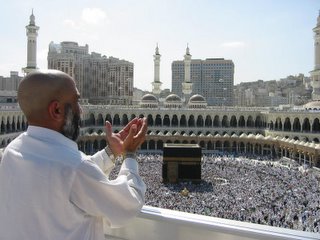
Do you know why millions of Muslims are in Mecca this week? Did you know that Mecca is in Saudi Arabia? Well, the Hajj is an annual pilgrimage to Islam's holiest place Mecca, Saudi Arabia. Why go to Mecca? What are the core beliefs of Islam anyway?
More than a billion people call themselves Muslim. Of all the world's religions, only Christianity claims more believers. So, what's Islam all about? In a word, "surrender." Perhaps we can answer a few more piebald questions with an overview of the religion.
Islam began with the visions of Muhammad ("the Prophet"), a merchant born in the year 570 in Mecca, Arabia (now Saudi Arabia). One day, at the age of 40, Muhammad was meditating in the mountains surrounding Mecca when an angel appeared to him and said, "You are the messenger of God." Until his death in 632, Muhammad frequently experienced visions that he believed came either directly from God or from the angel Gabriel.
The term "Islam," Arabic for "surrender" or "submission," suggests much of what Muhammad saw in his visions. Humans were created to serve and be obedient to God, and the believer finds salvation in surrendering to God's will.
Muhammad called Allah the one true God and creator, the ruler of a universe whose order reflects his infinite power and wisdom. God gives guidance to humans through his revealed word, and will use adherence to that word to judge humans on the Day of Reckoning. Paradise awaits the righteous, while hell awaits those who reject God's law.
Islam's scripture is called the Qur'an ("reading"). Originally memorized and communicated orally, it was written down a few decades after Muhammad's death. The words of the Qur'an are believed to be God's own, dictated to Muhammad for him to learn verse by verse. Because of this, Muslims believe it cannot be successfully translated from Arabic. Translations of the Qur'an into other languages are regarded as paraphrases and not used for ritual purposes.
Muslims can also look for guidance in the Hadith ("report"), a collection of the words and deeds of the Prophet and his family. A third source of guidance, known as ijma ("consensus"), began to develop in the 8th century to standardize Islamic law and belief. Between the Qur'an, Hadith, and ijma, Islam is held to provide a complete blueprint for human society, encompassing guidelines not only for belief and behavior but for society and government as well.
The Qur'an and Hadith spell out the essential duties of a Muslim, known as the Five Pillars of Islam. These duties are:
- Shahada, the profession of faith that "There is no god but God, and Muhammad is his prophet." This profession of faith must be pronounced at least once in a lifetime, with a full understanding of its meaning and inner assent to its truth.
- Salat, the ritual prayer performed five times a day--at dawn, noon, mid-afternoon, evening, and night--while facing toward Mecca. On Fridays, there are services in the mosque, with sermons based on verses from the Qur'an.
- Zakat, alms to benefit the poor and needy. Islam regards charity and other social service as essential; prayer and professed faith are nothing in the absence of good works.
- Sawm, fasting, obligatory between sunrise and sunset during the month of Ramadan and recommended at other times. All healthy adult Muslims, excluding pregnant women, abstain from eating, drinking, smoking, and sex during the fast.
- Hajj, a pilgrimage to Mecca that all Muslims must perform at least once in their lives if they can afford it. More than 2 million Muslims converge on Mecca each year.
For some Muslims, jihad ("fighting" or "striving") represents a virtual sixth pillar, though the concept has been interpreted in various ways. Islamic tradition says that jihad can be fulfilled by the heart (struggling against one's own evil impulses); by the tongue and the hand (supporting what is right and correcting what is wrong); or by the sword (combating the enemies of Islam).
Jesus answered, "I am the way and the truth and the life. No one comes to the Father except through me” (NIV, John 14.6).
No comments:
Post a Comment